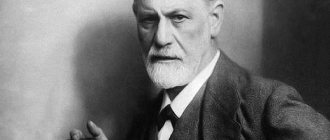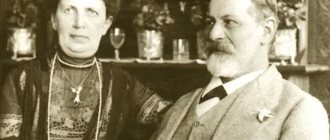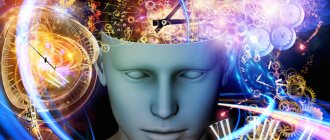Perhaps no personality theory was as widely known as psychodynamic theory (psychoanalysis), which went far beyond the boundaries of psychological science and influenced not only the development of psychology, but also sociology, medicine, culture, and art of the 20th century. Its founder was the Austrian scientist, psychoanalyst, psychiatrist and neurologist Sigmund Freud (1856 - 1939).
Freud considered the main source of personality development to be innate biological factors (instincts), which generate libido energy (attraction, desire). It is the energy of a person’s life actions and finds release in sexual behavior. According to the scientist, a complex dynamic interaction occurs between instincts and drives on the one hand and between consciousness and moral and ethical standards on the other. This interaction is regulated by human behavior. Moreover, the unconscious plays the main role in this. This explanation led to the emergence of a whole direction in the theory of personality as psychodynamic (psychoanalysis).
Freud's structural model of personality
Freud believed that a mature personality consists of three principles: Id (It), Ego (I), Superego (Super-I).
The id (It) represents the primitive, innate and instinctive aspects of the personality, it functions in the unconscious and is associated with biological drives (sleep, food, defecation, etc.), filling human behavior with energy. The id contains passions, and as a biological principle it is irrational and immoral. The id obeys the pleasure principle and maintains a central position for the individual throughout life. According to Freud, the Id (It) is something dark, biological, not regulated by laws or rules. This is the initial structure of the psyche, which provides a discharge of psychic energy, but this happens in an impulsive and irrational form.
Ego (I) is a set of cognitive and executive functions of the psyche, conscious of a person, responsible for making decisions. The ego satisfies the desires of the id to the extent that real circumstances allow and is guided by the restrictions imposed by the external world. That is, no matter what your desires are, you must take reality into account and tolerate the postponement of your needs until acceptable conditions are created. The release of libidinal energy is inhibited or directed in another direction, acceptable for the given situation.
The superego (Super-I) is the bearer of moral standards, the critic and censor of all human desires. The superego is formed under the influence of society on the consciousness and subconscious of a person, his acceptance of values and norms of public morality. The main source of the formation of the superego are parents, loved ones, teachers and educators, those people with whom a person enters into long-term relationships throughout his life.
How do the Id, Ego and Superego interact?
Once born, a child has only the Id (It) and lives according to the principle of pleasure. When he faces prohibitions from his parents and people around him, he develops as a person and the Ego (I) and Super-ego (Super-Ego) appear. Consequently, under the pressure of the society in which he lives, he has an antagonistic relationship with it, but without this pressure personal growth is impossible.
According to Freud, the id requires the satisfaction of instincts, unconsciously directs psychic energy to regulate mental processes and human states. The unconscious drives that the Id sends are in constant conflict with the Superego, i.e. with moral standards. The constant contradictions between them are resolved by the Ego (I). The ego reconciles both sides so that the drives of the id are satisfied, but moral standards are not violated.
Freud's model of personality (Id, Ego, Superego) is divided into three zones: the unconscious, the preconscious and the conscious. Consciousness is the top, the preconscious and unconscious are the “underwater” part. The id is completely unconscious and inaccessible to consciousness. The superego is formed in the process of interaction with surrounding people and society. The content of the preconscious can be realized by a person, but it requires effort. The mechanism for the formation of the Super-ego in a child is identification with a close adult by gender, whose traits and qualities become the content of the Super-ego. The development of the psyche and superego in children goes through overcoming the Oedipus complex in boys and the Electra complex in girls.
Oedipus complex in boys and Electra complex in girls
According to Greek mythology, King Oedipus killed his father and married his mother, not knowing that she was his mother. Freud believed that the Oedipus complex conceals the essence of the sexual complex that constantly gravitates over every man. That is, the boy is attracted to his mother, and considers his father a rival - this causes admiration, fear, and hatred in the child. He wants to be like his father, but at the same time he wants his death, fearing castration for his attraction to his mother. Overcoming the Oedipus complex in boys occurs at the age of 5-6 years. At this time, their super-ego is formed.
The Electra complex in girls is associated with craving for the father and hostility towards the mother, and develops at the age of 5-6 years. The appearance of this complex is also associated with Greek mythology and is reflected in the behavior of Electra, who persuades her brother Orestes to kill her mother and her lover, thereby avenging the death of her father. Girls' first love is for their mother. But subsequently she sees a physical difference in the structure of the body, she does not have a penis, like her father and brother, and envy develops, which is the mental analogue of castration fear for boys.
Basic concepts of psychoanalysis
Here are a few fundamental ideas of psychoanalysis, to one degree or another, inherent in most psychoanalytic methods.
— A person’s behavior, the state of his psyche (consciousness) largely depend on internal unconscious motives, which are determined by LIBIDO or sexual desire (in the process of development, this position was repeatedly corrected or challenged by Freud’s followers).
— The main cause of psychological problems of the individual (neurotic behavior, depression, anxiety, complexes) is the inevitable conflict between unconscious impulses (desires) and the conscious part of the personality.
— A significant weakening of this conflict can be achieved through the individual’s awareness of the traumatic memories that cause the conflict, by releasing this material from the sphere of the unconscious and subsequent work with it through a psychoanalyst (living, analyzing, accepting the traumatic material).
— The human psyche has protective mechanisms that prevent awareness of the contents of the unconscious (main article — Psychological defenses of the individual).
Stages of personality development according to Freud
Freud believed that libidinal energy, associated with the life instinct, is the main factor in the formation of human character. In its development, a personality goes through several stages, they are associated with a shift in erogenous zones - those areas of the body whose stimulation causes pleasure, hence the name of age stages (stages).
Oral stage (up to 1 year) – during this period, desires are satisfied when the oral cavity is irritated. The child sucks milk, swallows, and when there is no food, sucks his own finger. All the baby’s desires cannot be satisfied, so the first restrictions appear and the Ego (I) begins to form. At the same time, such personality traits as greed, demandingness, insatiability develop, whatever is offered.
Anal stage (1-3 years) – the aerogenic zone moves into the intestinal mucosa. The baby is learning toilet skills. Parents teach neatness, new requirements and prohibitions arise. The Super-ego (Super-I) begins to form as the embodiment of social norms, internal censorship and conscience. During this period, accuracy, punctuality, stubbornness, secrecy, aggressiveness, etc. develop. According to Freud, children should be encouraged to have regular bowel movements and at the same time praised, then the child will develop positive self-esteem and, possibly, creative abilities.
Phallic stage (3-5 years) . The child begins to realize his sexual differences and is interested in the genitals. If before this children's sexuality was directed towards themselves, now children begin to experience sexual attachment to adults. Boys develop the Oedipus complex, girls develop the Electra complex. This is a period of strict prohibitions, when the Superego (Super-I) is intensively formed. New personality traits appear: introspection, prudence.
The latent stage (5-12 years) is a period of sexual calm, especially at 6-7 years. Preparations for growing up are underway. The ego and superego are actively developing. Attractions emanating from the Id (It) are successfully controlled. Children's sexual desires are repressed, and the child's interests are directed in another direction: communicating with friends, studying at school, etc.
The genital stage (from 12 years of age) begins with puberty. All erogenous zones are united, and a desire for normal sexual communication arises. Teenagers experience increased excitability and sexual activity. The id intensifies its action, and the individual has to fight its aggressive impulses using psychological defense mechanisms.
Psychological defense mechanisms
There is an unstable balance between the Id, Ego and Superego. The id sends out instincts that need to be satisfied. But some desires do not correspond to moral standards. The superego monitors compliance with these norms and inhibits desires. A compromise between them is achieved at the expense of the Ego. When an internal conflict is not resolved for a long time, a person becomes neurotic, because... He can maintain his mental state only thanks to psychological defense mechanisms. Each person has his own set of such mechanisms. Freud identified 5 of them.
Crowding out . When unacceptable desires (memories, thoughts, experiences, etc.) are repressed into the unconscious. Gradually a person forgets about such a desire, but the tension remains. Penetrating through the unconscious, it reminds itself of itself in the form of symbols in dreams, slips of the tongue, mistakes, etc.
Regression. Psychological defense, expressed in a return to childhood behavior patterns and habits: biting nails, spoiling things, being capricious, etc. In adults, it may include dissatisfaction, incontinence, desire for risky situations, opposition to authorities, etc.
Rationalization is a disguise. Avoiding true thoughts and feelings through more acceptable explanations of one’s own behavior. This suppresses guilt and shame, preserves self-esteem, and achieves a state of inner comfort. These “rational” explanations often look stupid and illogical
Projection is the unconscious or conscious transfer by a person of his states to external objects or the attribution of his own desires and feelings to other people. In other words, the blame for what happens is always placed on another person or circumstance.
Sublimation . When there is sexual or aggressive desire, the desire is directed in a different direction. Thanks to the sublimation of sexual desire, creative people can experience an extraordinary rise, masterpieces of painting or music are created, discoveries are made in the scientific field, etc.
What are projection and rationalization?
The concepts of projection and rationalization are also associated with epistemology and the theory of knowledge. Both projection and rationalization indicate that we often see reasons for our feelings and actions that have nothing to do with the real reasons.
In near-psychoanalytic speech, projection refers to the tendency of people to attribute to others qualities that they themselves have. But Freud understood projection more broadly and deeply. From his point of view, projection is close to the concept of load - this is a person’s tendency to see the causes of his feelings in external objects, while we ourselves load the objects with our own relationships.
For example, a person woke up for some reason in a bad mood, and it seems to him that his wife, child, or dog are to blame. And the next day he wakes up and everything is fine with him - and now he has a beloved wife, a smart child, and a wonderful dog.
Another example: we feel hostility towards a person for unconscious reasons unknown to us, but since we feel the need to somehow explain to ourselves the feeling that has arisen, it begins to seem to us that this person himself is hostile to us, and we are only responding to him. This is how we unconsciously place the reasons for our feelings in the world around us. (By the way, projection is an effective tool for understanding delusions in paranoid schizophrenia. This is a case where the primary disturbance appears to be pathological affect, an acute experience of fear or wariness, probably due to biochemical disturbances in the brain. However a person must somehow explain to himself his condition: if there is fear, then something dangerous is happening. This is how the delusion of persecution is born.)
Rationalization is a person’s tendency to explain his actions by internal motivation rather than by external reasons.
Suppose a person under hypnosis was given a delayed suggestion, saying: “Five minutes after you wake up, you will jump and clap your hands.” The man wakes up and five minutes later jumps up, claps his hands and exclaims something like: “I remembered where I put the keys!” The person jumped because of a suggestion, but does not know about it and therefore feels the need to explain his action to himself (the person comes up with the reason, of course, unconsciously).
Opinion
First, as expected, about the good. Of course, S. Freud’s merits in the field of psychotherapy and psychology are great. He was the first to create a detailed theory of personality development, created an original method of treating neurotic disorders, developed a system of clinical observations based on self-analysis, substantiated and put into practice his method of studying mental processes that could not be studied at that time in other ways. Discovered what is beyond our consciousness. But!
Not all of Freud's research received scientific recognition, although his ideas were translated into practice and attracted the attention of many scientists. But what about the stages of personality development (oral, anal, phallic, etc.)? How to relate to the Oedipus complex and Electra? The Great Sigismund Shlomo Freud just wants: “Are you serious?” It turns out that without sexual attraction, even in children, there is no personal development? Oh? Maybe that’s why the child’s treatment did not produce results and the doctor only worked with adults? Or maybe the scientist’s bipolar disorder is to blame for everything?
Free association method
It is one of the ways to penetrate the unconscious part of the psyche. An associative series is collected on the topic of what worries the patient. For example, you are bothered by a black raven outside the window (A), you should tell the psychoanalyst what pops up in your memory in connection with this image (B). Then the analyst will ask you to find an association (C) for the association that has arisen (B) and so on along the chain until you reach the “core of the complex.” Over time, this method has undergone many changes and is today used in all types of psychotherapy. It can often be recognized by the question: “What is it like that you are talking about?”
Dream interpretation technique
Freud was the first to bring dreams into science; before that they were considered some kind of evil spirit. He called dreams “the royal road to the unconscious.” It is a well-known fact: people who have a poor connection with the unconscious do not dream, or rather, they do not remember them. And people who remember their dreams well and clearly, who see them quite often, have a good connection with the unconscious. Through sleep, material from the unconscious part seeps into consciousness. By describing his dream to a psychotherapist, the patient can get answers to many questions.
The history of psychoanalysis, or How a woman quarreled between Freud and Jung.
More details










